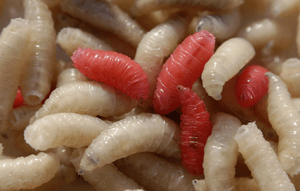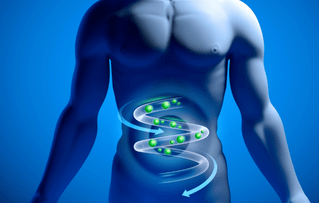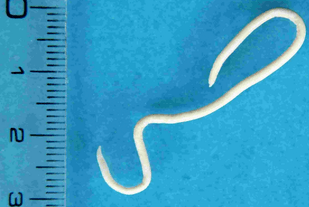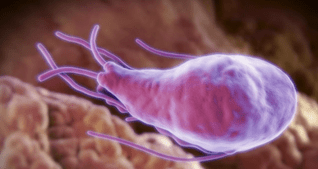It is even harder for the average person to imagine how many parasites can threaten his health. These "settlers" can live for many years in the human body, literally sucking life out of it and poisoning it with their poison.
Parasites

From the point of view of medicine, parasites include protozoa and protozoa. Depending on their habitat, they are divided into exogenous (lice, aphids and others) and exogenous.
Endoparasites have their own subspecies:
- Larvae are born of insects.
- Protozoa (amoeba, lamblia).
- Worms (worms or worms).
Ways of infection
Each parasite has its own way of invading the human body. The most common way is seasoning, meaning with the help of water or food. Many insects can carry parasitic larvae, polluting the environment. By consuming raw water, the food that has not been washed and is not thoroughly cooked, a person will become infected with parasites.
Some species are transmitted directly by person-to-person contact - this is known as family contact. For infection it is not necessary to have direct contact with the distributor, it is enough to use the household items alone. This is how enterobiasis and some other parasites spread.
An equally popular vector pathway. In this case, the parasite is carried by a blood-sucking insect. Therefore, they can be collected after being bitten by a mosquito or other insect.
The last method of taking the parasite is through the skin injection, the second name is the action. Infection occurs through the infestation of the larvae through the mucous membranes and skin. This occurs due to contact with contaminated soil or water in an area of water.
Symptoms
The parasite in the human body can live for a long time and does not manifest on its own. Of course, symptoms will be present, but they are disguised as other diseases. That is why a person for a long time may not be aware that he is infected.

Symptoms most often appear depending on the location of the larvae, but the body can signal infection and other manifestations. The most common are:
- Flatulence,and constant, indicate the presence of worms in the small intestine;
- Diarrhea.Because the parasite absorbs sodium chloride;
- Constipation.Worm tangles can clog certain organs;
- Pain in the joints and muscles.These pains are due to the larvae moving through the human body, the immune system reacts in this way;
- Allergy.The parasite itself is an allergen to the body, and damage to the stomach wall contributes to indigestion and the penetration of food molecules into the bloodstream;
- Occurrence of granulomatosis.This is a cancer due to the enveloping of cells of the egg body that are destroyed by the parasite;
- Dermatological manifestations;
- Anemia.Usually people get anemia precisely due to the action of parasitic forms;
- Weight fluctuates greatly;
- Mental disorder.During live activity, the parasite secretes a toxin that adversely affects the nervous system of the host. The consequences of body poisoning can be neurotic, depressed, and anxious;
- Grind your teeth.This is the sound of teeth grinding while sleeping. This is the response of the nervous system to the appearance of foreign bodies. But this fact is not conclusively supported by science;
- Sleep disturbance.As a rule, it arises from uncomfortable feelings. One example is pinworms here, which lay eggs at night. Out of the rectum, pinworms secrete toxins that cause intense itching;
- Dysbacteriosis;
- Cancer;
- Chronic fatigue.Occurs due to a lack of nutrients, negatively affecting the state of the body;
- Respiratory diseases.Certain types of parasites can live in the respiratory tract, causing disease. Other parasites cause colds by traveling through the respiratory system;
- Immune disorder.The absorption of most vitamins by the parasite leads to impaired body barrier functions and a higher chance of disease.
But there are also symptoms characteristic of the presence of parasites in a particular human organ. For example, papillomas, bald spots on the head, cracked heels, . . . can indicate the survival of the parasites in the liver. In addition, the presence of certain types of parasites can cause a number of diseases in humans.
Disease detection

Unfortunately, some doctors deny their duty and do not send a person to special studies to identify parasites in the body. The most common analysis was the distribution of worm eggs. The fact is that the parasite can reside in many different organs.
There have been cases where worms have been found in the brain and human eye. Is it possible that their eggs from the brain go into the feces? Most probably not. Even when there are worms in the intestine, the parasite's eggs may not be found.
The doctor must first visually examine the patient. On the surface, one can suspect the presence of the parasite in humans. The easiest way to detect them is by a blood test to detect antibodies that are specific to the worms.
Description of the Human Parasite
There are dozens of types of parasites that live in the human body.
A worm or a helminth is a type of worm.Their size depends on the species, for example, roundworm is up to 40 cm long. Some species can be more than 10 meters long. The worms' favorite habitat is the gut, but they're often found in other organs, even the brain.
For example, roundworm larvae circulate in the body, gathering nutrients and returning to the intestines, where they grow and reproduce. They usually live in the respiratory organs. The presence of roundworm in the human body is accompanied by a disturbance of the internal organs, a poisoned body, allergic manifestations and even an increase in temperature.
Among the swine tapeworms, they travel through the bloodstream to the brain.  This parasite enters the body through poorly processed meat products. This worm lives up to 20 years.
This parasite enters the body through poorly processed meat products. This worm lives up to 20 years.
Pinworms usually develop in children but are quite common in adults. These worms are small in size, up to 1 cm long. The spread of pinworm eggs occurs by way of family contact. The female exits the rectum and lays eggs in the outer folds of the anus. The toxin secreted by the female causes intense itchiness, leading to the egg falling into a person's hand and being transferred to everything around him.
The second name for helminthiasis is dirty hand disease. All people who come into contact with carriers can become infected. So, when detecting pinworms, should treat the whole family.
Toxocarais a parasite that lives in dogs. They penetrate the human body and also thrive in it. Unlike these worms in the dog body, human toxins do not pass out, but they affect many organs and cause a number of diseases. Toxocaras can be infected through the soil, as the larvae of these worms pass out in the feces of the dog. But the parasite's eggs can also be spread from your dog's wet breath.
Alveococcus and Echinococcusinfect the body in many ways. Their danger lies in the larvae transforms into cysts, which can be found in various internal organs.
Giardia is the simplest.Like pinworms, Giardia most commonly infects children. They not only decrease a child's immunity, but also cause mental and physical delays.
They not only decrease a child's immunity, but also cause mental and physical delays.
This list is far from complete. The main danger of parasites is that no one is immune from infection. Their secrecy leads to the fact that a person eats the parasite for many years without doubting it. Adhering to personal hygiene, regular housing cleaning and adhering to heat treatment standards for meat products are not a way to prevent bad infection. It will be very helpful if you go through your doctor's examination and pass the necessary tests every six months, to stop the spread of the parasite.
















































